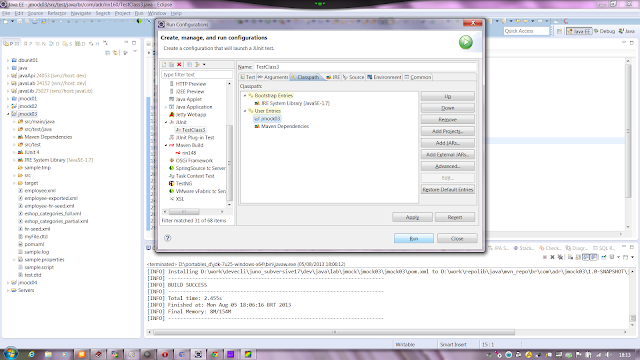ENVIRONMENT
Spring-MVC using Spring Security.
PROBLEM
Suddenlly, the compiler begins warning:
WARN [CglibAopProxy] (CglibAopProxy.java:...) - Unable to proxy method [public final void org.springframework.web.servlet.mvc.AbstractController.setSynchronizeOnSession(boolean)] because it is final: All calls to this method via a proxy will be routed directly to the proxy.
SOLUTION
First it was commented the annotation:
@PreAuthorize("permitAll")
on the Controller class.
Recompiled and the warns disappeared.
So, the problem comes from the procedure triggered by this annotation.
To fix, it was taken off the following attribute from "security:global-method-security" element:
proxy-target-class="true"
on the spring-security.xml configuration.
- spring-security.xml configuration setup:
BEFORE:
<security:global-method-security pre-post-annotations="enabled" secured-annotations="enabled"
jsr250-annotations="enabled" proxy-target-class="true">
</security:global-method-security>
AFTER:
<security:global-method-security pre-post-annotations="enabled" secured-annotations="enabled"
jsr250-annotations="enabled" >
</security:global-method-security>
COMMENT
The proxy-target-class attribute enabled (proxy-target-class="true") forces the use of CGLIB proxying (for example, to proxy every method defined for the target object, not just those implemented by its interfaces).
However, there are some issues to consider, like the final methods that cannot be advised, as they cannot be overriden.
See more at Spring AOP documentation .
FULL WARN MESSAGES:
2014-05-28 14:18:26,148 WARN [CglibAopProxy] (CglibAopProxy.java:263) - Unable to proxy method [public final void org.springframework.web.servlet.mvc.AbstractController.setSynchronizeOnSession(boolean)] because it is final: All calls to this method via a proxy will be routed directly to the proxy.
2014-05-28 14:18:26,150 WARN [CglibAopProxy] (CglibAopProxy.java:263) - Unable to proxy method [public final boolean org.springframework.web.servlet.mvc.AbstractController.isSynchronizeOnSession()] because it is final: All calls to this method via a proxy will be routed directly to the proxy.
2014-05-28 14:18:26,150 WARN [CglibAopProxy] (CglibAopProxy.java:263) - Unable to proxy method [public final void org.springframework.web.servlet.support.WebContentGenerator.setSupportedMethods(java.lang.String[])] because it is final: All calls to this method via a proxy will be routed directly to the proxy.
2014-05-28 14:18:26,151 WARN [CglibAopProxy] (CglibAopProxy.java:263) - Unable to proxy method [public final java.lang.String[] org.springframework.web.servlet.support.WebContentGenerator.getSupportedMethods()] because it is final: All calls to this method via a proxy will be routed directly to the proxy.
2014-05-28 14:18:26,151 WARN [CglibAopProxy] (CglibAopProxy.java:263) - Unable to proxy method [public final void org.springframework.web.servlet.support.WebContentGenerator.setRequireSession(boolean)] because it is final: All calls to this method via a proxy will be routed directly to the proxy.
2014-05-28 14:18:26,152 WARN [CglibAopProxy] (CglibAopProxy.java:263) - Unable to proxy method [public final boolean org.springframework.web.servlet.support.WebContentGenerator.isRequireSession()] because it is final: All calls to this method via a proxy will be routed directly to the proxy.
2014-05-28 14:18:26,152 WARN [CglibAopProxy] (CglibAopProxy.java:263) - Unable to proxy method [public final void org.springframework.web.servlet.support.WebContentGenerator.setUseExpiresHeader(boolean)] because it is final: All calls to this method via a proxy will be routed directly to the proxy.
2014-05-28 14:18:26,152 WARN [CglibAopProxy] (CglibAopProxy.java:263) - Unable to proxy method [public final boolean org.springframework.web.servlet.support.WebContentGenerator.isUseExpiresHeader()] because it is final: All calls to this method via a proxy will be routed directly to the proxy.
2014-05-28 14:18:26,153 WARN [CglibAopProxy] (CglibAopProxy.java:263) - Unable to proxy method [public final void org.springframework.web.servlet.support.WebContentGenerator.setUseCacheControlHeader(boolean)] because it is final: All calls to this method via a proxy will be routed directly to the proxy.
2014-05-28 14:18:26,153 WARN [CglibAopProxy] (CglibAopProxy.java:263) - Unable to proxy method [public final boolean org.springframework.web.servlet.support.WebContentGenerator.isUseCacheControlHeader()] because it is final: All calls to this method via a proxy will be routed directly to the proxy.
2014-05-28 14:18:26,153 WARN [CglibAopProxy] (CglibAopProxy.java:263) - Unable to proxy method [public final void org.springframework.web.servlet.support.WebContentGenerator.setUseCacheControlNoStore(boolean)] because it is final: All calls to this method via a proxy will be routed directly to the proxy.
2014-05-28 14:18:26,154 WARN [CglibAopProxy] (CglibAopProxy.java:263) - Unable to proxy method [public final boolean org.springframework.web.servlet.support.WebContentGenerator.isUseCacheControlNoStore()] because it is final: All calls to this method via a proxy will be routed directly to the proxy.
2014-05-28 14:18:26,154 WARN [CglibAopProxy] (CglibAopProxy.java:263) - Unable to proxy method [public final void org.springframework.web.servlet.support.WebContentGenerator.setCacheSeconds(int)] because it is final: All calls to this method via a proxy will be routed directly to the proxy.
2014-05-28 14:18:26,154 WARN [CglibAopProxy] (CglibAopProxy.java:263) - Unable to proxy method [public final int org.springframework.web.servlet.support.WebContentGenerator.getCacheSeconds()] because it is final: All calls to this method via a proxy will be routed directly to the proxy.
2014-05-28 14:18:26,155 WARN [CglibAopProxy] (CglibAopProxy.java:263) - Unable to proxy method [public final void org.springframework.web.context.support.WebApplicationObjectSupport.setServletContext(javax.servlet.ServletContext)] because it is final: All calls to this method via a proxy will be routed directly to the proxy.
2014-05-28 14:18:26,155 WARN [CglibAopProxy] (CglibAopProxy.java:263) - Unable to proxy method [public final void org.springframework.context.support.ApplicationObjectSupport.setApplicationContext(org.springframework.context.ApplicationContext) throws org.springframework.beans.BeansException] because it is final: All calls to this method via a proxy will be routed directly to the proxy.
2014-05-28 14:18:26,155 WARN [CglibAopProxy] (CglibAopProxy.java:263) - Unable to proxy method [public final org.springframework.context.ApplicationContext org.springframework.context.support.ApplicationObjectSupport.getApplicationContext() throws java.lang.IllegalStateException] because it is final: All calls to this method via a proxy will be routed directly to the proxy.









































